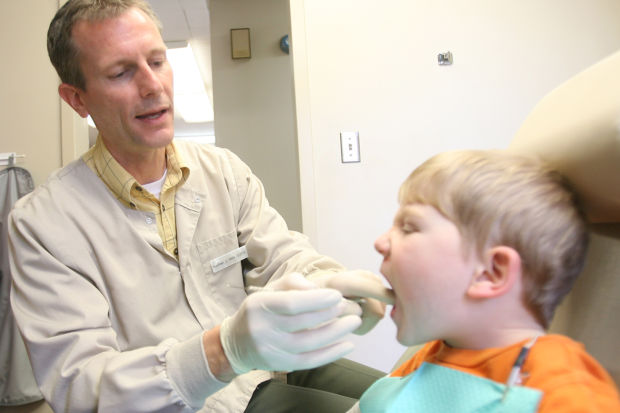MASON CITY — Dental care should be part of a child’s life even before they turn a year old.
As soon as the teeth erupt, parents need to start brushing their child’s teeth, said dentist Nathan Hehr, of Nettleton Dental Group, Mason City, and dentist Matt Hansen, of Central Park Dentistry, Mason City.
Infants typically get teeth around 6 months of age, but it can also happen before or after 6 months.
To keep the teeth clean, parents should use a toothbrush, or if that seems too bulky, a washcloth can work, too, Hehr said.
“They can massage the gums and wash the teeth clean,” he said.
When it comes to toothpaste, children’s toothpaste is available or non-fluoridated types, Hansen said. These should be used until a child is old enough to spit the toothpaste out.
Parents should remember brushing is more important than the toothpaste itself, Hansen said.
“That’s the most important thing — getting the plaque off the tooth,” he said.
Once toothpaste is utilized, only a small amount should be used.
“You put enough on so you can just see the toothpaste on the bristles,” Hehr said.
Parents should clean their child’s teeth twice a day making sure one of the cleanings is right before bedtime. This is particularly important because formula, breast milk or whatever a child drinks before bed (except water), has sugar and can cause damage to a child’s teeth overnight, Hehr said.
“The biggest thing is baby bottle cavities,” he said. “Infants are put down for a nap or put down to bed and they’ve got a bottle in their mouth. If there’s anything in there other than water, that can still damage the teeth.”
Hansen agreed with the importance of not letting a child go to bed with a bottle.
“Bottle to bed has the most severe consequences of anything,” he said. “That’s huge. The number one thing is not putting a bottle in bed.”
Hehr also suggests limiting what children have in sippy cups for the same reason. Children should only have access to sippy cups full of milk or juice at meals, snacks or a particular amount of time.
“I always tell parents it’s OK to use sippy cups...but don’t let them tote that around all day if it has milk or juice in it,” he said. “If you want to do that, water only.”
Parents also need to limit a child’s sugar intake including candy, juice and pop.
“We still see a lot of pop intake and a lot of candy,” Hansen said. “Those tolls add up.”
Parents will also have to floss their child’s teeth once a day when molars start to emerge and are touching, Hehr said.
“They make handle flossers that are kid friendly,” he said. “It’s easier both for parents and the kids.”
They also work well for when a child is old enough to floss on their own, Hehr added.
It’s also recommended that children visit the dentist for the first time by age 1 and every six months after that, Hehr said.
He said the initial dentist visits won’t be very detailed, but allow the dentist to understand what is going on in the child’s mouth and make sure that parents know what they should be doing as far as dental care.
“We spend the majority of the time on parent education,” Hansen said.
Each subsequent visit then includes a little more work, such as polishing the teeth, he said.
“We do just a little bit more and a little more as the child allows,” he said. “If you take it super easy or maybe you don’t do as much... they get warmed up to everything.”
“When parents do start early, by age 4 or 5 kids are hopping back to the chair by themselves and not worry about anything,” Hansen added. “If the parents start late, such as at age 5 or 6, there’s a healthy fear there. It’s a little bit harder.”
Starting dental care and visit to the dentist early, will make it easier on the child, dentist and parents.
Parents also need to remember that proper dental care will set the foundation for good oral health in the future.
“Baby teeth are sometime underestimated for how important they are,” Hansen said.
“Not only do they provide chewing of food, but they are holding the place for the next permanent tooth. When we lose them early it can cause problems with growth and development of permanent teeth.”

No comments:
Post a Comment